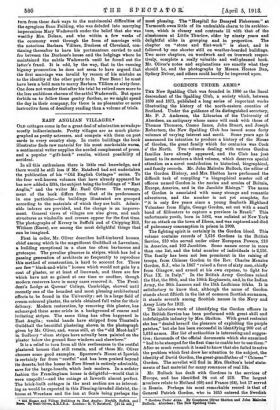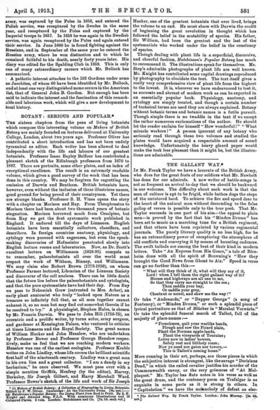GORDONS UNDER ARMS.*
THE New Spalding Club was founded in 1886 as the lineal descendant of the Spalding Club, a society which, between 1839 and 1871, published a long series of important works illustrating the history of the. north-eastern counties of Scotland. Under the guidance of its distinguished secretary, Mr. P. J. Anderson, the Librarian of the University of Aberdeen, an antiquary whose name will rank with those of Thomas Thomson, Cosmo Innes, John Stuart, and Joseph Robertson, the New Spalding Club has issued some forty volumes of varying interest and merit. Some years ago it announced its intention to produce a history of the House of Gordon, the great family which for centuries was Cock o' the North. Two volumes dealing with various Gordon families have already appeared, and the Club has just issued to its members a third volume, which deserves special attention as a novel contribution to historical, biographical, and family records. Mr. John Malcolm Bulloch, the editor of the Gordon History, and Mrs. Skelton have performed the difficult task of compiling "a biographical muster roll of officers named Gordon in the navies and armies of Britain, Europe, America, and in the Jacobite Risings." The name of Gordon is associated with many strange and romantic adventures, and the number is not yet complete, for "it is only five years since a young Seaforth Highland Volunteer from Elgin, George Gordon, set out with a small band of filibusters to capture a province in Brazil." This unfortunate youth, born in 1882, was enlisted at New York for an attack on the town of Ilheos, and was captured and died of pulmonary consumption in prison in 1909.
The fighting spirit is certainly in the Gordon blood. This volume contains records of 1,616 Gordons in the British Service, 219 who served under other European Powers, 218 in America, and 103 Jacobites. Some names occur in more than one list, and the total number of individuals is 2,116. The family has been not less prominent in the raising of troops, from Chinese Gordon to the Rev. Charles Menzies Gordon, S.J., who in 1867 "raised a force of sixty men, chiefly from Glasgow, and armed at his own expense, to fight for Pius IX. in Italy." In the British Army Gordons raised the 81st, the 89th, and the 100th Regiments, and, in the Indian Army, the 30th Lancers and the 15th Ludhiana Sikhs. It is satisfactory to know that, although the name of Gordon stands about fiftieth in the list of common Scottish surnames, it stands seventh among Scottish names in the Navy and Army Lists for 1912.
The laborious work of identifying the Gordon officers in the British Service has been performed with great skill and indefatigable industry by Mrs. Skelton. With great restraint she has "denied herself the pleasure of exploiting the purple patches," but she has been successful in identifying 900 out of 1,616 names. Her list of authorities is interesting and sugges- tive; thousands of the official documents which she examined "bad to be stamped for the first time to enable her to use them."
After so much research it is sad to know that she failed to solve the problem which first drew her attention to the subject, the identity of David Gordon, the great-grandfather of " Chinese " Gordon. The novelist will find in Mrs. Skelton's brief state- ments of fact material for many romances of real life.
Mr. Bulloch has dealt with Gordons in the services of Europe, and has identified 94 out of 219. The largest numbers relate to Holland (68) and France (64), but 17 served in Russia. Perhaps his most remarkable record is that of General Patrick Gordon, who in 1655 entered the Swedish army, was captured by the Poles in 1656, and entered the Polish service, was recaptured by the Swedes in the same year, and recaptured by the Poles and captured by the Imperial troops in 1657. In 1658 he was again in the Swedish service, was again recaptured by the Poles and again entered their service. In June 1660 be is found fighting against the Russians, and in September of the same year he entered the Russian army, where he won distinction and to which he remained faithful to his death, nearly forty years later. His diary was edited for the Spalding Club in 1859. This is only one of many extraordinary careers which Mr. Bulloch has summarized.
A pathetic interest attaches to the 103 Gordons under arms as-Jacobites, of whom 60 have been identified by Mr. Bullocb, and at least one very distinguished name occurs in the American list, that of General John B. Gordon. But enough has been said to indicate the interest and the fascination of this remark- able and laborious work, which will give a new development to local history.















































 Previous page
Previous page